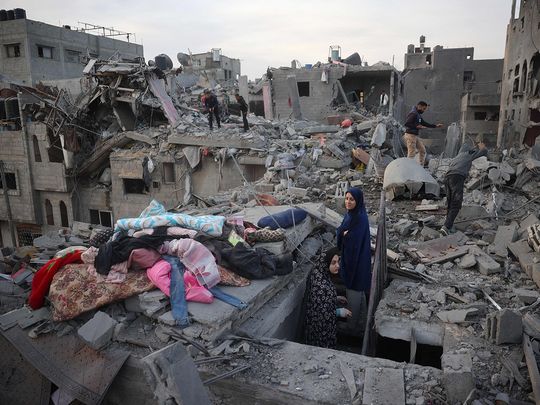
Reporting breaking news about world events in the mainstream media may be, as it is often called, the first rough draft of history, but that reporting may also on occasion fall into a patch of uneven ground.
Sometimes, as was evident in recent days, a big story gets lost in the shuffle because its unfortunate timing pitted it in competition for global attention with another, yet bigger story elsewhere that got picked up and spread around the world.
Such was the case with the news story detailing the events in Syria, which was so big, so arresting, so loud it drowned out that of Gaza, a story in its own right that would’ve been considered massively important any other time, but now simply went underreported.
Passing largely unnoticed by us this week was the latest heart-wrenching news from the Gaza front.
On Monday, 26 people were killed in an Israeli strike on a multistorey residential building in the besieged town of Beit Hanoun in northern Gaza, where displaced members of an extended family were housed. As of this writing on Tuesday, 16 bodies had been recovered, while residents continued to dig for the rest of the dead, many children among them. Photos online showed more than a dozen bodies, wrapped in blankets, being buried in a mass grave.
No rescue teams, no Civil Defense, no health care
Since early October this year, news of Israeli forces encircling Gaza’s northernmost border communities, which included Beit Hanoun, were widely reported in the media. There, residents were subjected to constant bombardment that has ethnically cleansed the area of tens of thousands of its inhabitants, many of them forced to flee at gunpoint.
So far, the campaign has killed a reported 3,700 people, “between those who were buried in the streets and those whose fate is still unknown and who remain missing underneath the rubble”, wrote news reporter Miriam Berger in the Washington Post on Tuesday.
Also on Tuesday, the Gaza Health Ministry (or what’s left of it) said that at least 28 people were killed and 54 others injured in Israeli air strikes over the previous 24 hours. “The Health Ministry records casualties that reach hospitals”, added Berger, “but the enclave’s medical system has collapsed, and rescue workers say many dead and injured go uncounted”.
In much of Gaza these days, there are virtually no rescue teams, no Civil Defense and no health care. And the dead are buried not in cemeteries, where dead men, women and children deserve to rest in peace, but on the sides of streets, in backyards and in mass graves.
Pathological behaviour
Israel, it appears, wants to see Palestinians buried there rather than in cemeteries, dozens of which it has, for reasons only a therapist can explain, deliberately destroyed, an act that has revolted the world, virtually all of whose cultures consider the desecration of graves taboo.
Why Israel needs to evince this kind of pathological behaviour is inexplicable. But evince it did — from the outset. Less than four weeks after its military forces invaded Gaza, at least 10 gravediggers were killed at the main cemetery in Beit Lahia, a city in northern Gaza.
So. Don’t, I say, let a headline of an article, such the one that appeared in the New York Times on Sunday, “Ceasefire talks between Israel and Hamas gain momentum”, fool you.
Benjamin Netanyahu said on Monday, while the renewed ceasefire talks were underway, that his government had no intention of stopping its war in Gaza “now”, since Israel’s end-goal there was “the annihilation of Hamas and the elimination of its military and administrative capabilities”. The job, he added, was not finished.
Yet, as far back as Oct. 23, the US Secretary of State himself, Anthony Blinken, asserted that Israel had already “managed to eliminate Hamas’s military capacity, along with its senior leadership”. With that accomplished, he added, it was time to “bring the war to an end, with an understanding of what will follow”.
This war was waged to wreak vengeful destruction on Gaza as a habitat and horrific death on Gazans as a people, a war that has already been classified by sundry international bodies and human rights groups as being genocidal due Israel’s intentional campaign of destruction of infrastructure, indiscriminate killing of civilians and the systemic use of starvation as a weapon of war against the population.
The people of Gaza have endured these horrors every week of the last 52 weeks and every day of the last 433 days since the war started. The story of their immeasurable sorrows, their unspeakable suffering and their irretrievable losses should not be allowed to get lost in the shuffle as another, more spectacular story competes with it for global attention.
— Fawaz Turki is a noted academic, journalist and author based in Washington DC. He is the author of The Disinherited: Journal of a Palestinian Exile











